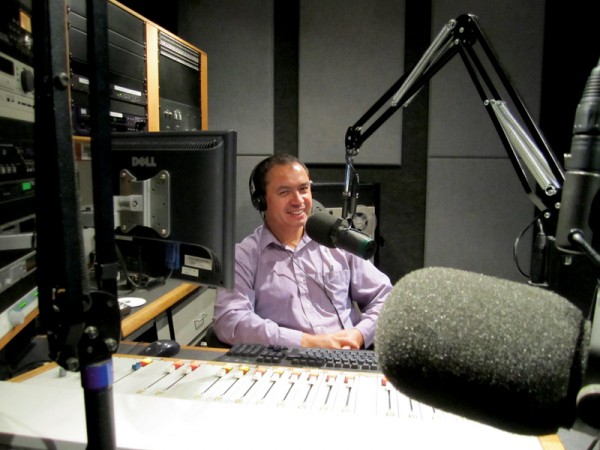Spanish and Portuguese Professor Luis Cárcamo-Huechante wins Humanities Research Award to study indigenous Mapuche culture
The inspiration for Luis Cárcamo-Huechante’s current research project lies in a moment from his childhood in Tacao, a rural village in southern Chile, in the 1970’s.
“I used to listen to the radio after 8 p.m. after a long day of going to school and helping my grandmother. One night when I was seven or six years old I listened to a show from southern Argentina about the Mapuche language. Even though I grew up in a Mapuche community, I had never heard the Mapuche language. The radio show woke me up in a way.”
The Mapuche, an indigenous group of 1.2 million people residing in southern Argentina and Chile, have suffered great linguistic and cultural losses since the 19th century. In recent years, Mapuche organizations have struggled to regain Mapuche lands and identity.
Cárcamo-Huechante, who is of Mapuche origin, is examining the ways in which Mapuche radio programs, poetry and music revitalize contemporary Mapuche culture and foster cultural diversity in the region. He is using knowledge gained during his research to enrich his teaching at The University of Texas at Austin.
“My inspiration is rooted in my childhood,” says Cárcamo-Huechante, an assistant professor in the Department of Spanish and Portuguese. “I am excited about this project because it brings together the personal and the academic.”
Cárcamo-Huechante is one of 10 College of Liberal Arts faculty members to receive a 2010 Humanities Research Award. The $15,000 award was established two years ago by Dean Randy L. Diehl in response to a shortage of external grants for humanities research. Such research is vital to our understanding of society and the larger world and can sometimes influence citizens and social movements for generations.
“It’s a recognition of the wonderful scholars we have in this department,” says Jill Robbins, chair of the Department of Spanish and Portuguese. For researchers like Cárcamo-Huechante, the award will be especially useful to fund travel expenses.
“We have a limited amount of funding for travel,” Robbins adds. “In the Department of Spanish and Portuguese, of course, everything is based on travel.”
“It is very important to feel that the university stimulates research in the humanities,” says Cárcamo-Huechante, who stresses the value of research to the intellectual community and students of the university.
“Support for research is a way to support me not only as a scholar but as a teacher. When I travel, I get new readings and experiences that come back with me to the classroom.”
For example, Cárcamo-Huechante taught students to use the critical approach of his own research in a graduate seminar he taught in spring 2011. Students in the course examined the relationship between sound and culture while reading texts by canonical Latin American writers.
“What I am doing can enrich the way you look at the broader body of literature,” Cárcamo-Huechante says.
Cárcamo-Huechante’s approach broadens traditional views on indigenous languages and cultures by emphasizing the role of environmental sounds. Mapuche artists incorporate the sounds of animals, nature and even machines in their work. The importance of environmental as well as human sounds is reflected in the name of the Mapuche language, “Mapudungun.”
This compound word combines the Mapuche word for earth or universe, “mapu,” with the word for language, “dungun.”
“What I see now is that our media environment is becoming homogenized by a mainstream media,” Cárcamo-Huechante says. “In the case of Chile and Argentina, for example, mainstream radio stations don’t incorporate indigenous languages and cultures.”
In Cárcamo-Huechante’s view, Mapuche radio broadcasters, poets and musicians “not only reclaim sonorous space for the culture of the Mapuche people, but also are fostering linguistic and cultural diversity in the current context of globalization.”
